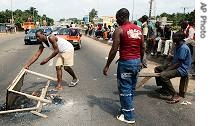-
(单词翻译:双击或拖选)
By Franz Wild
Korhogo, Ivory Coast
15 August 2006
 Supporters of Ivory Coast President Laurent Gbagbo block a road as part of a protest Wednesday, July 19, 2006 |
||
--------
In Korhogo, a town of about 150,000, many people stay in the noisy restaurants until late into the night.
But the relaxed atmosphere can be deceptive1. International observers, local authorities and citizens all agree crime has shot up since rebel soldiers returned to their barracks about six weeks ago as part of a peace process calling for the demobilization of forces. Korhogo's deputy mayor Silué Sigata says twenty house break ins were reported in a week, compared to only the occasional report previously2.
Zoumana Yeo, one of the rebels, says the absence of rebel soldiers from the streets is the reason for the increased violence.
"They were there for security," he said. "Since they left, there are no more soldiers to look after civilians4 at night."
Demobilization is the first step of a program, designed to disarm5 and reintegrate all those who took up arms in Ivory Coast's civil war, which began in 2002. The program applies to the rebel New Forces, who still occupy the north, as well as newly recruited government troops and militias6, which fought alongside the government in the west.
In the north, the group that took on security duties is called the Dozos. It is a brotherhood7 of hand-picked members, who claim to have mystical powers.
It is midnight, and around 50 Dozos are gathered outside their leader's house in Korhogo.
The Dozos have been around for generations. They stopped policing the streets when the New Forces took control of the north four years ago. But when rebel commanders realized crime was becoming a problem again they asked the Dozos to resume their nightly patrols.
None of the Dozos wants to be named for fear of being associated with the rebels.
University of Illinois Professor Tom Bassett tells VOA the Dozos are not a cohesive8 group and are politically fragmented. Some are attracted to politics, he says, but others are not.
Carrying old muskets9 and wearing dreaded10 wigs11 and camouflage12 clothing, the Dozos do not want to be very visible.
Their leader says they chase down criminals, but are not violent.
He says, they do not shoot or hit anybody, just arrest people, and hand them over to the rebel authorities. Deputy mayor Sigata says the police does not have the resources to guard the streets itself.
The leader says the Dozos are a spiritual group, and members possess supernatural powers.
He says, the group does not accept just anyone. Members, he says, are selected according to their moral standing13.
Professor Bassett says the Dozos are believed to have the power to protect themselves from the force of other animals, when they kill them. This is necessary,
he says, to protect them from death, poor health, or a bad crop, which is what happens to other people when they harm another creature.
The Dozos patrol the streets until dawn and then return to civilian3 life.
The Dozo leader says, during the day, they are like ordinary citizens, doing their jobs and dressing14 in civilian clothes. They keep watch only at night.
Ama Coulibaly, who runs a small night stall selling cigarettes and sweets in Korhogo, says he noticed the town is safer now that the Dozos are back.
He says, you could not walk around at night before, and robbers took everything. But since the Dozos have returned, the town is much safer.
 收听单词发音
收听单词发音
1
deceptive

|
|
| adj.骗人的,造成假象的,靠不住的 | |
参考例句: |
|
|
|
2
previously

|
|
| adv.以前,先前(地) | |
参考例句: |
|
|
|
3
civilian

|
|
| adj.平民的,民用的,民众的 | |
参考例句: |
|
|
|
4
civilians

|
|
| 平民,百姓( civilian的名词复数 ); 老百姓 | |
参考例句: |
|
|
|
5
disarm

|
|
| v.解除武装,回复平常的编制,缓和 | |
参考例句: |
|
|
|
6
militias

|
|
| n.民兵组织,民兵( militia的名词复数 ) | |
参考例句: |
|
|
|
7
brotherhood

|
|
| n.兄弟般的关系,手中情谊 | |
参考例句: |
|
|
|
8
cohesive

|
|
| adj.有粘着力的;有结合力的;凝聚性的 | |
参考例句: |
|
|
|
9
muskets

|
|
| n.火枪,(尤指)滑膛枪( musket的名词复数 ) | |
参考例句: |
|
|
|
10
dreaded

|
|
| adj.令人畏惧的;害怕的v.害怕,恐惧,担心( dread的过去式和过去分词) | |
参考例句: |
|
|
|
11
wigs

|
|
| n.假发,法官帽( wig的名词复数 ) | |
参考例句: |
|
|
|
12
camouflage

|
|
| n./v.掩饰,伪装 | |
参考例句: |
|
|
|
13
standing

|
|
| n.持续,地位;adj.永久的,不动的,直立的,不流动的 | |
参考例句: |
|
|
|
14
dressing

|
|
| n.(食物)调料;包扎伤口的用品,敷料 | |
参考例句: |
|
|
|















